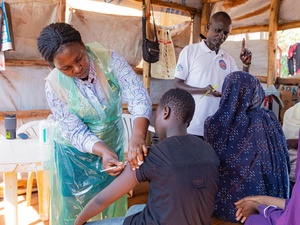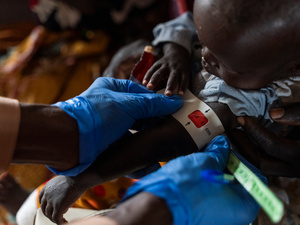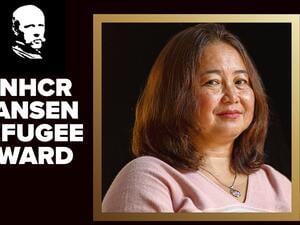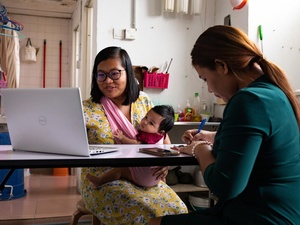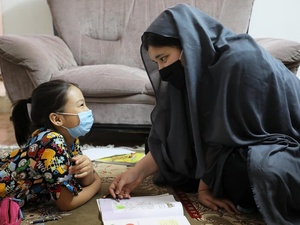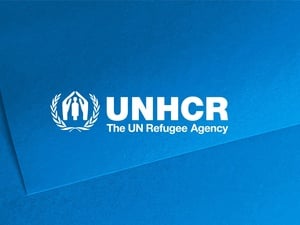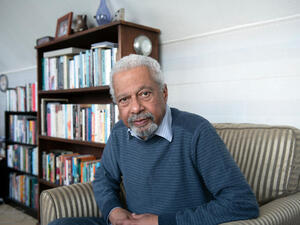Include refugees in national AIDS control programmes, urges UNHCR
Include refugees in national AIDS control programmes, urges UNHCR
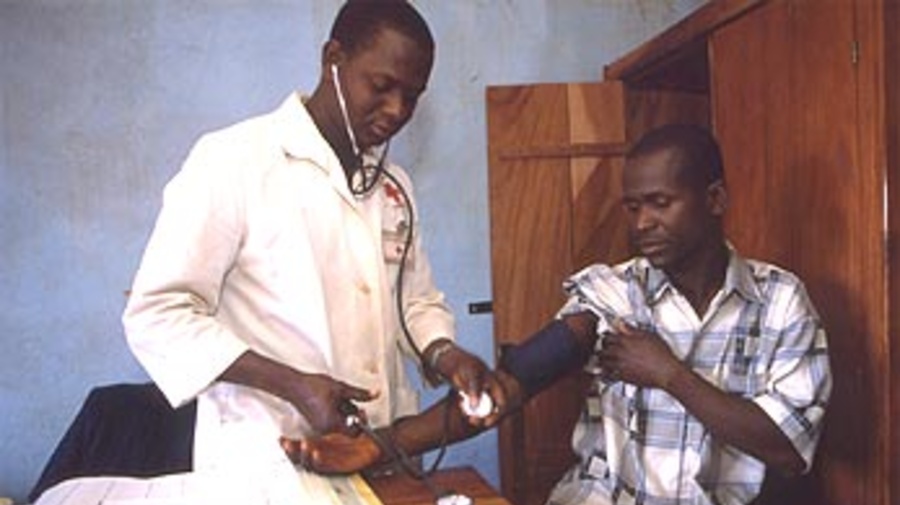
A refugee being examined in a clinic in Massakoundou camp, Guinea. Regular checkups and awareness-raising campaigns have meant that HIV infection rates are often lower in refugee camps than in surrounding populations.
GENEVA, Oct 2 (UNHCR) - The UN refugee agency has urged states to include refugees in their national AIDS control programmes, saying that the fight against the pandemic would only be partial unless countries specifically included refugees in these programmes.
Speaking at a side meeting for delegates attending the 54th session of UNHCR's Executive Committee (ExCom) on Wednesday, Paul Spiegel, the agency's Senior Technical Officer on HIV/AIDS, noted that refugees and surrounding populations interacted closely, making it crucial for refugees to constitute part of national AIDS control programmes (NACPs).
Spiegel noted, for example, that out of 16 countries with sizeable refugee populations that had approved proposals with an HIV/AIDS component to the Global Fund to fight HIV/AIDS, Tuberculosis and Malaria (GFATM), only five (or 31 percent) had included refugees in their proposals. He cautioned that the refugee populations, particularly in the developing world, were too large to be ignored.
Twenty-nine countries in Africa are host to at least 10,000 or more refugees. The developing world also accounts for 90 percent of the 42 million people living with HIV/AIDS, 70 percent of whom live in sub-Saharan Africa.
Spiegel said that while recognising the inter-linkage between complex emergencies, displacement and HIV/AIDS, refugees should not be blamed for the spread of the devastating disease that has become the leading cause of death in sub-Saharan Africa. He said recent studies had shown that in reality, HIV infection rates are often lower in refugee camps than in surrounding populations.
In a bid to ensure that states take into account refugees when drawing up their national HIV/AIDS strategic plans to combat the deadly scourge, UNHCR is proposing to become a co-sponsor of UNAIDS. As a co-sponsor, the refugee agency would collaborate with other co-sponsors of UNAIDS such as the World Bank, UNICEF (UN Children's Fund) and WHO (World Health Organisation) as they work with governments to set up national programmes.
UNHCR is also recommending that funding organisations such as the World Bank, the GFATM and bilateral government donors make the inclusion of refugees a pre-condition for funding of NACPs in countries with refugees.
Wednesday's meeting, attended by some of UNHCR's key donor countries and refugee-hosting nations, was held to provide an update on the agency's strategic plan to combat HIV/AIDS among refugee populations during the period 2002-2004.
The refugee agency said it planned to expand its HIV/AIDS programmes that have been piloted in east and southern Africa. These projects would be extended to west and central Africa as well as to Asia.
Discussing its other plans, Spiegel said the move to establish closer links with NACPs would be strongly backed by a policy to follow the approaches adopted by NACPs in their respective countries. For example, anti-retroviral (ARV) drugs such as Nevirapine, used to prevent mother-to-child transmission, would only be made available to refugee women in countries where this was part of the national programme. Furthermore, UNHCR is in the midst of developing an ARV policy as more developing countries are providing such medications for long-term use by people living with HIV/AIDS, said Spiegel.
He noted, however, that this overall policy to mirror the HIV/AIDS policies of the country of asylum had presented some dilemmas. As long-term ARV treatment becomes more common in countries of asylum, it raises the difficult decision of whether to start similar treatment in a situation where refugees were about to return home to a country that did not have the same policy or ability to provide such medications.
In other plans, UNHCR will seek to pursue more funding and technical expertise. Where possible, the agency will use technical resources provided by the countries of asylum and, if needed, support their efforts to build their technical capacity.
However, UNHCR's Director for Operations, Marjon Kamara, who chaired Wednesday's meeting, warned that the agency's ability to implement programmes to combat HIV/AIDS could be affected by chronic fluctuations in the funding of the agency's overall programmes.
"We need to be realistic," Kamara said. "Funding is going to be at the crux of our activities. If we fail to get the funding needed to maintain our programmes, they [the programmes] will be jeopardised to the same extent as other sectors such as health and education."


